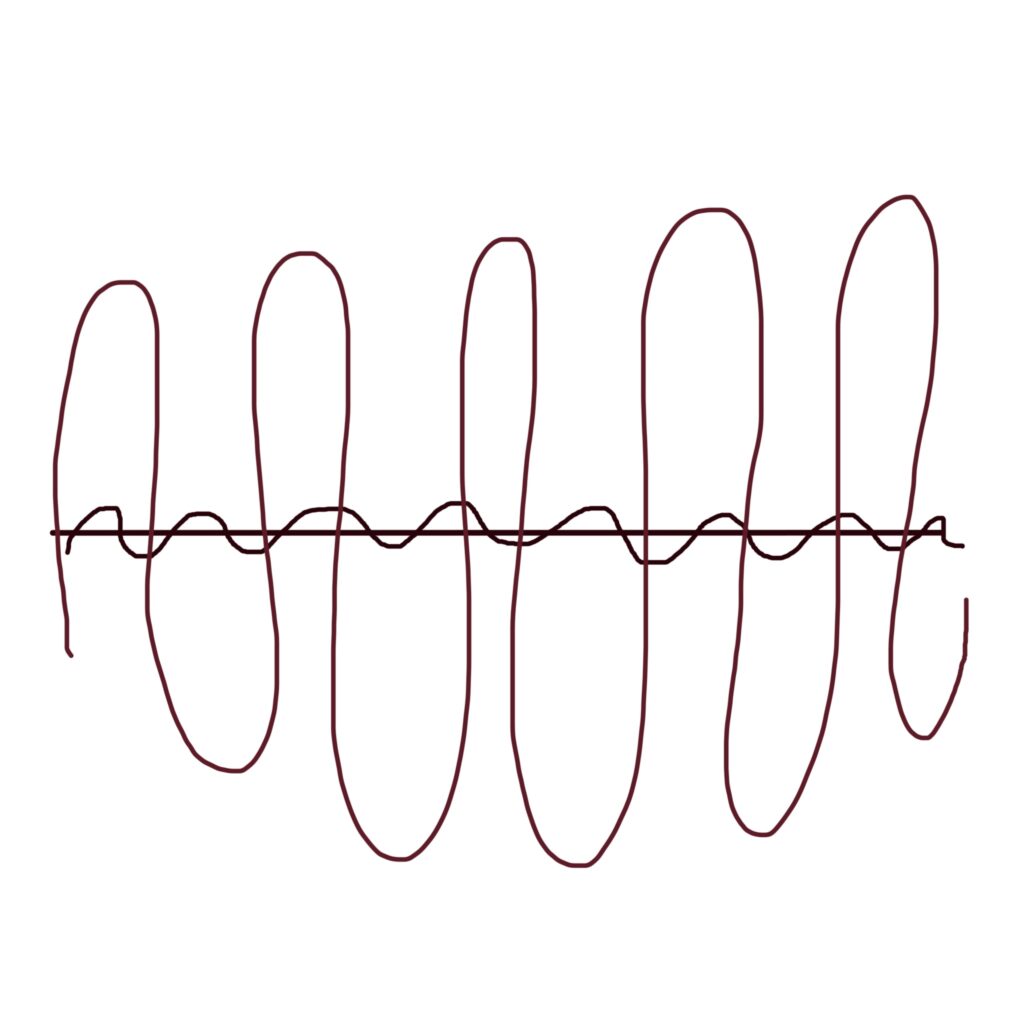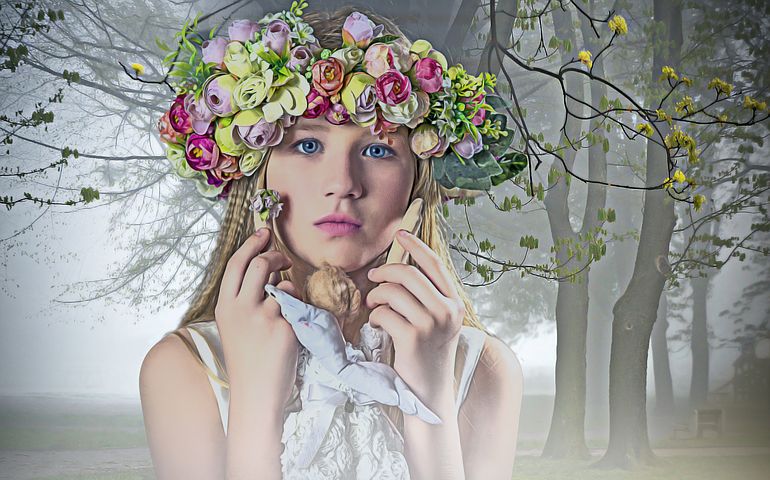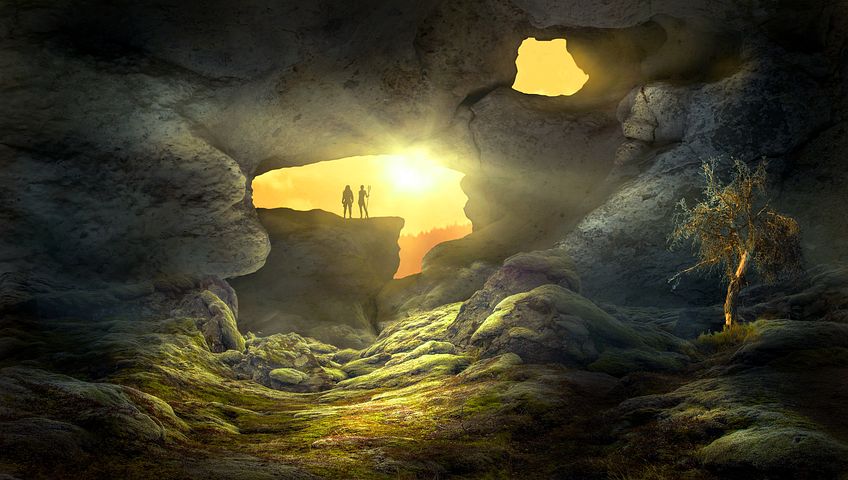Hi Mary-
Are there any additional markers on the path that you believe might be encouraging despite how dark or horrible they feel? For example, allowing oneself to feel deep sorrow and realizing that the depth of that feeling could be progress, despite how awful it might feel? I have been sitting a lot in states that feel somewhere between contemplation and blankness. It seems that perhaps this type of aimless sitting (almost wallowing) is part of what a dark night is asking for?”- Jen

Hi Jen-
Picture a basic line extending from left to right. If we experience no emotions at all, we are flat, following this line (so, basically sociopaths). People who experience a bit of emotional intelligence or awareness will be like a small wave. Those who have greater emotional intelligence and awareness will have a larger wave, dipping lower and rising much higher than that line.
This means that the possibility for those who are deeply feeling is that they can acutely feel emotions like despair as well as experience the negativity and darkness of the world. But they can also feel the experience of bliss, joy, and happiness in a way that those who have not gone to such depths cannot.
We require contrast– if we know grief and loss, we have also known love and happiness. Those who are deeply feeling typically get mired in the depths, and block themselves from feeling goodness. This is sort of like being swept away by the undertow of a wave but never experiencing the crest of it.
We often block ourselves because there is a fear that if we experience happiness, it will somehow be taken away. Many times we hold onto the contrast of life– those natural ebbs and flows– with fear, because we know that the heights of ecstasy, or simple contentment, will change over into something else. That fear is totally and completely right, by the way. But if we recognize this fear, we can eventually ask ourselves if we want to spend the time we are experiencing the beauty, peace, joy, and happiness within ourselves anxiously awaiting whatever tragedy or bad thing is likely to happen next.
If you recognize that this fear is totally correct– that something bad will happen next, because in contrast it most certainly will– we can actually enjoy our good feelings when they arise, instead of spending them anxiously awaiting the fallout.
Our mentality (our inner pessimist, if you will) makes us believe that the natural ups-and-downs of life are us being victimized by life, or that something is wrong with us for feeling our inner sorrow. Any deeply feeling person will at some point get to feeling the despair that underlies the human condition. When we accept all of our emotions– even our darkest ones, even the “dark nights”– what happens is that they can simply flow through us, and we no longer caught up in them or feel victimized by them.

When we are caught by the undertow we feel as if we are stuck with those emotions forever. We rarely recognize that if we are stuck in an emotional state– be it depression or bliss– that that simply means that there is a need for some type of support so we are no longer stagnated. Often we rightfully feel stuck, as there may be factors like ancestral grief, or personal despair and loneliness that emerged in utero or in early childhood. We are not very well culturally educated on how epigenetics (ancestral and family trauma) can be passed down to us, or that simply because we have experienced a “stuck” emotional state for a long period of time doesn’t mean that we have to spend the rest of our lifetime stuck in that state.
We cannot be happy or full of bliss all of the time. Our emotions are intended to be like wave forms through us, and if we “go with the flow” we will find that we can allow those waves, rather than reacting to them or resisting them.
If we see emotions as being e-motional, meaning that in the highest of emotional intelligence we experience them flow through us, we can work through this cycle of perpetual misery and not spend the time that we do experience happiness, joy, and the goodness of life become marred with the fear of the knowledge that such happiness will pass.
We can then feel the depths and the heights (and everything in between) that life has to offer. We can be happy one moment, and sad another, and know that this is okay. We can experience both joy and sadness simultaneously, as with deep feeling, our emotions are not unidimensional. They are complex creatures, and to be in relationship with them is to feel the fullness of life pour through us. All of our creativity, life force/power, sexuality, and consciousness is found through opening ourselves up to feeling fully. The key is to allow this flow to go through us, without getting attached to it or assigning meaning to it. We can feel depressed without needing to know why, just as we can feel joy without needing to know why. Self-awareness eventually lead us to experiencing paradoxical states, such as despair and bliss, terror/panic and wonder, simultaneously.

What is interesting is that society expects us to be flat, emotion-less creatures. We even revere this state. Look at spiritualities that end up revering sociopathic gurus and the fallout– in them we see some sort of twisted ideal because in all of our pain, we wish to become disconnected and unfeeling. To experience an end to our suffering. This wish to end suffering is understandable, but if we ignore our emotions, they don’t go anywhere.
Even if we pretend to no longer feel, our bodies and the way we live our lives bear out the suffering we have yet to reckon with. Our disconnection permeates how we view ourselves, other people, and the world. It is through embodiment, through feeling all that is within through our bodies, that we find ourselves more connected. By allowing ourselves to feel, and being compassionate towards whatever we are feeling (our rage has a reason to be, just like our contentment does), that our emotions start flowing through us.
If we allow ourselves to open wide, to fully feel, we become more and more connected to ourselves, to one another, and to reality. This is the “oneness” that is so often spoken about. It is connection. When we fully connect to ourselves, we realize oneness, the beautiful golden light that shows us that we are all composed of the same stuff.
On a practical level, we often spend so much time considering our suffering and trauma. We often need to. But there is a point in which we could stand to consider what is preventing us from feeling joy, bliss, health, connectedness, and ecstasy.
On a certain level, we cannot identify ourselves as happy because we so identify with the stuck and negative emotions within ourselves. Who would we be without our negativity, our cynicism, our suffering? What would happen if we saw the world as something other than a negative place filled with harmful individuals?

To truly do shadow work is to know that humans are capable of the worst evils, and that despair and darkness of all kinds lie within all of us. Irvin Yalom wrote “despair is the price one pays for self-awareness. Look deeply into life, and you’ll always find despair”. But it is in this despair that a certain type of perspective occurs. If we allow it to flow through us, our darkness no longer becomes something we cling to. It is something we see, but we can recognize that what we are feeling is something passing through us. It is impermanent, and simply a feeling. It is not who we are, and we don’t need to identify ourselves with it.
When we get to this awareness, it does transform into this blankness that you are speaking of, Jen. You are on the cusp of understanding this, that the gateway of truly allowing ourselves to feel allows for a certain type of transcendence. It is the ultimate irony, that allowing ourselves to feel so deeply eventually gives way to a flow so large that we no longer identify and cling to our feelings, but it is what happens. It is just that the only way out is through, to paraphrase Robert Frost.
It is typically at the point you are at, Jen, that people begin to question what is preventing them from being gentle with themselves. I see so much in spirituality these days that amounts to self-hatred. We do not get anywhere by torturing ourselves through extremes or by bullying ourselves. There is a place for discipline in our lives, but we have had enough outer bullies, and we have our own inner critic that always tells us that we are not good enough. We seek to cleanse and purge and release the parts of ourselves that we view as morally or physically “bad” without considering that these parts of ourselves may heal best through acceptance and love instead.
We can learn patience, gentleness, and acceptance for ourselves exactly as we are.
It is in the practice of such gentleness that we can begin to develop some measure of self-love, instead of endlessly believing that we should be someone other than who we are.
So the real question here is what purpose that wallowing is offering. Is it a way to feel? Or is it a way to prove to yourself that you are not worthy, you are not lovable, or that you need to feel or be someone other than who you are? What would you be doing if you were not wallowing? Is said wallowing preventing you from living your life? If you were to move on from this “dark night” what might be scary? What part of your life, or who you believe yourself to be, might have to be reconsidered?
These are all tough questions, I realize. But so often we fear change, and become habituated to being stuck in places that don’t really serve us. By recognizing change and feeling as goodness, as connection, as coming into contact with our personal power (our ability to effect change in our own lives) we can see that change is the stuff we are made of. This recognition, known in a bodily way, allows for us to question what we are feeling and see its purpose.
You may need to wallow. That wallowing may be showing you that you need some time off, to be in a state of non-doing, because learning gentleness and non-doing are still on the “to learn” agenda. That wallowing or “dark night” may be because you are terrified of living your life, or moving into this blankness into further revelation, because such further revelation might require you to reconsider who you are, what you believe, and how you live your life.
But I can say that plenty of people have experienced the doorway you are in now, and that the decision to gain further perspective (and it is a decision, always) can lead to the change that you seek… and eventually lead to the end of seeking, and the end of needing to be anything other than exactly who you are in the present moment.
To come into deep feeling states is to touch a void. That void is a portal to a new realm, another perspective, and a new way of being. If we venture far enough into that void, the darkness becomes a source of beauty, rather than pain. We then see that darkness from a new perspective, as being part of us but not defining us, and not something we are powerless to.
I hope that helps in some way–
Mary Mueller Shutan is a spiritual teacher, practitioner, and author of several books, including The Body Deva (teaches how to transmute/work with emotions through the body) and The Spiritual Awakening Guide

Hi Liesa-
Glad the blogs were of help to you!
Love both parts of this encouragement, I so much needed, at this exact moment. These 2 blogs together brought so much clarity to energies I am feeling. A massive wave of freedom, clarity and bliss but right behind it is “more conflict, doom and trauma”. The under toe / white cap metaphor is perfect! Mary you have a brilliant writing ability!
Thank you so so much for all your energy and specific knowledge the world is in so need for right now.
Hi Jen-
I do think that any big change results in a sort of disorientation of identity. Being okay with letting parts of ourselves go, knowing that they either are no longer serving us or it is simply time to venture into becoming a new being, is helpful. There often is a grief with this, as it is a sort of death, but it eventually turns over into a birth once again.
When we do experience huge fluctuations in consciousness, or see things from a permanently different perspective due to expanded consciousness, there can be a feeling of wrongness. It is recognizing that what we thought we knew was false. We can move beyond that into understanding that what we thought we knew previously to be true was true for us at the time, and have a bit of grace for ourselves. It may still be true, just not from our current perspective (and even more confusingly, it may become once again true in the future).
I think at one point you either questioned why I shifted courses or recognized why I do it, and it is because of exactly what you describe. My books and courses are sort of a bookmark in time, where I was in terms of consciousness during that period. Just an example, but it can show how we can shift with open arms while still celebrating who we used to be.
I do think that working through our fears of rejection, and considering what sort of validation we still require from others (rather than internally) is key to healing pretty much anything within. You are on the right track 🙂
Thank you so much for this response, Mary. These words of encouragement have already helped, and I feel gentler toward myself already. Your questions provide much to consider, and it will take me some time to process and see what arises. Initially I can share that one fear regarding moving on from this “dark night” is realizing that I don’t know who I am and thus never really did.
This makes part of me feel like I was “wrong” about many fundamentals of life. However, I appreciate your words regarding acceptance, and it feels like accepting myself as a growing and changing being is needed, rather than ruminating on past life events and ways in which they could have unfolded if I had acted differently. I also realized that allowing for emotions to really flow through requires me to ask for what I need from others, which is often more time, sensitivity, and understanding, so that I can process life the way that I need to, in my own way, and with that awareness comes a fear of rejection, as if I will miss the boat that others are boarding, which I can imagine that some reading this post might be able to relate to.
But without honoring my own cadence and allowing my emotions to flow, it feels like I am a musician playing the songs of others rather than playing my own (and dancing to my own) tune.
There are certainly little gems that are helpful to me here. Thanks Jen and Mary.
W-allowing is sometimes just exactly where I have needed to be. It’s good to know more about feeling safe to move forward.
Inner healing essentially empties, and quiets our personal void. At first, it felt nice. The quiet empty of nothingness. Moving forward, it became a source of unrest. The void became hungry.
Hi Cassandra-
Glad the blogs resonated with you! I do think that we find the right info for us at the right time spiritually for sure.
Mary, Your last 2 blogs resonated profoundly with me. I wonder if we (spiritual awakening community) are gradually becoming more in tune with each other as our personal growth accelerates. Thank you for your wisdom, and i thank Jen for her question too!